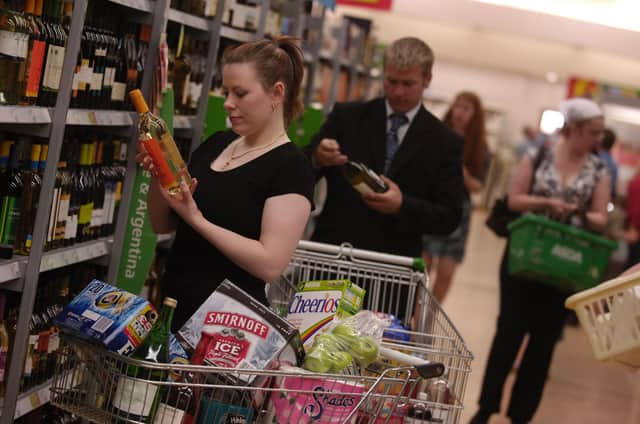Shopkeepers in Scotland say minimum unit pricing allows them to compete with supermarkets


Some small retailers have said there has been little change to their sales of drinks most affected by the policy, while others have noticed a reduction or have just stopped stocking the products.
Where drinks such as high-strength cider had their price increased due to the policy, shopkeepers told a Stirling University study that increased profit margin often compensated for any reduced sales.
Advertisement
Hide AdAdvertisement
Hide AdThe research into the policy's impact on small Scottish retailers also found fewer shops prominently displaying the price on the packaging on the most-affected products.
But shopkeepers told researchers that they feel "better able to compete with prices in supermarkets", according to Martine Stead, from the University of Stirling.
The deputy director at the Institute for Social Marketing and Health said the vast majority of small stores implemented the policy when it came into force in May 2018 "with little or no adverse effect on small businesses".
She added: "Retailers reported that they had reduced or stopped stocking some products which had seen particularly large increases in price after the implementation of minimum unit pricing, such as larger bottles of strong ciders.
Advertisement
Hide AdAdvertisement
Hide Ad"Overall we observed the most change amongst the high-strength cider and perry categories, which had typically been priced below minimum unit pricing.
"During the interviews, small retailers reported some changes in purchasing patterns, such as customers moving from higher to lower strength alcohol products, to products in smaller containers or to products perceived to offer better value now they were sold at similar prices."
Responding to the evaluation, Scotland's Public Health Minister Joe FitzPatrick said: "I welcome this sixth report in the comprehensive evaluation of
Scotland's world-leading alcohol minimum unit pricing policy which shows that small retailers feel sales of those drinks most affected by minimum unit pricing have fallen.
Advertisement
Hide AdAdvertisement
Hide Ad"This follows a report in June last year which showed a 3% decrease in the volume of pure alcohol sold per adult in the off-trade in Scotland in 2018.
"In addition, this latest report confirms high compliance with minimum unit pricing amongst small convenience store retailers.
"The positive findings show these retailers have experienced little or no adverse effects from the introduction of minimum unit pricing, with many reporting they can now compete with supermarkets on price."
Clare Beeston, from Public Health Scotland, said: "Minimum unit pricing has the potential to improve Scotland's relationship with alcohol and reduce the harm it causes, and these findings show an encouraging pattern of behaviour change emerging amongst small retailers and customers.
Advertisement
Hide AdAdvertisement
Hide Ad"Furthermore, these findings from the small retailer setting support evidence gathered earlier in the minimum unit pricing evaluation that compliance amongst retailers is high, and that minimum unit pricing has had the most effect on the products previously sold well below 50p per unit."
Alison Douglas, chief executive of Alcohol Focus Scotland said, “This research provides further evidence that minimum unit pricing for alcohol seems to be changing our drinking habits, for the better.
“People are switching away from high-strength, low priced alcohol like white cider, which prior to MUP retailed for as little as 18p per unit.
“As a result many retailers report they have reduced their stock or no longer carry these products.
Advertisement
Hide AdAdvertisement
Hide Ad“It’s also really encouraging to see that consumers are also switching to smaller size packs and lower strength products. As expected, all of these small changes are having an affect how much alcohol we are drinking.
“The annual Monitoring and Evaluation of Scotland’s Alcohol Strategy (MESAS) report in 2019 showed the biggest drop in consumption in 25 years, while figures on sales-based consumption in the first year of MUP show that Scotland bought 3.6% less alcohol from off-sales than in the previous year.
“Even a small reduction in the amount of alcohol consumed in Scotland will mean fewer lives damaged or lost because of drink.
“Increasing the price of alcohol is one of the most effective and cost-effective policy measures to reduce alcohol consumption and harm, however, we must also recognise that one measure alone will not be sufficient.
Advertisement
Hide AdAdvertisement
Hide Ad“Scots are still drinking enough for every adult to exceed the Chief Medical Officers’ low-risk drinking guidelines by a third on every week of the year.
“We need to build on minimum pricing with action to control how widely available and how heavily marketed alcohol is if we are to change Scotland’s relationship with drink for good.”
Comment Guidelines
National World encourages reader discussion on our stories. User feedback, insights and back-and-forth exchanges add a rich layer of context to reporting. Please review our Community Guidelines before commenting.